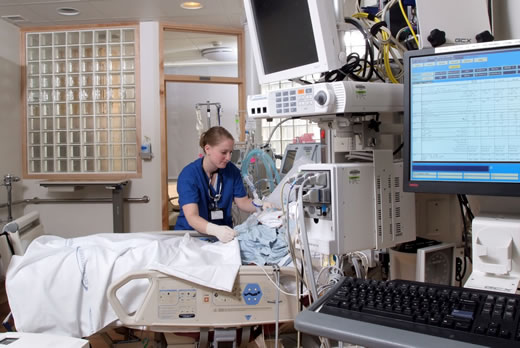Emory University Hospital (EUH) joins an elite group of only 20 national providers focused on complex stroke care with its Comprehensive Stroke Center Certification from The Joint Commission and the American Heart Association/American Stroke Association.
EUH is the only hospital in north Georgia to earn this designation and one of just two in Georgia.
"The Joint Commission's certification can only be earned by a dedicated, multi-disciplinary team that demonstrates the unique skills necessary to care for patients with the most severe and challenging types of strokes and cerebrovascular disease," says Daniel Barrow, director of the Emory MBNA Stroke Center and chief of neurosurgery service at EUH. "Our internationally recognized physicians and nurses are dedicated to providing the absolute highest level of care to our patients, and this certification is a clear validation of that focus."
Comprehensive Stroke Center Certification recognizes only those hospitals that have state-of-the-art infrastructure, staff and training to receive and treat patients with the most complex strokes.
Emory University Hospital, which sees more than 1,000 stroke patients each year, underwent a rigorous onsite review by The Joint Commission in February 2013.
"This Advanced Certification is an important recognition of the skills, experience and teamwork that has been developed at the Emory Stroke Center," says Fadi Nahab, medical director of the Emory Stroke Center. "Comprehensive designation of our Stroke Center recognizes Emory's role as a national leader that provides the next generation of stroke care and is responsible for setting and advancing the agenda in this highly-specialized area of care."
Immediate treatment is essential
Stroke is a disease that affects the arteries leading to and within the brain. According to the American Stroke Association, it is the number four cause of death and a leading cause of disability in the United States. Immediate treatment is essential when someone is having a stroke to reduce the effects and potential for permanent disability.
Ischemic stroke is the most common type of stroke and results when a blood clot blocks flow to the brain. Rapid administration of the FDA-approved clot-busting drug tPA (tissue plasminogen activator) can limit the potentially devastating effects of stroke.
"Emory University Hospital is thoroughly committed to providing our patients with the highest quality stroke care," says John Fox, CEO of Emory Healthcare. "Our focus on the right care at the right time means we are addressing our patients' complex needs quickly and effectively as well as eliminating the more extensive, long-term care that might have been necessary without timely and expert intervention. Comprehensive Stroke Center Certification recognizes the exceptional care we provide for our patients as well as the positive societal impact this specialized care has for our community."
EUH has state-of-the-art critical care specifically for stroke patients including a dedicated 27-bed Neurointensive Care Unit staffed around the clock by neuro-critical physicians who are full-time members of Emory University School of Medicine and whose expertise is stroke care.
Air transport helps critical patients reach EUH
Another example of national excellence is Emory Healthcare's Transfer & Access Service, which is designed to help critical patients such as those suffering a stroke reach the EUH. In conjunction with Emory Flight, Emory Healthcare's air medical transportation service, these services help critical patients such as those suffering a stroke make it to a specialized center such as EUH.
More than 50 percent of EUH's stroke patients are transported from other hospitals, and most of those arrive by air transportation because stroke patients require immediate and specialized attention to minimize the effects of stroke and to hopefully prevent disability. When distance, location or impaired roads could delay transport or endanger a patient's condition, air transportation to the Emory Stoke Center can save lives.
The three helicopters currently in use are equipped with advanced life support systems. "Emory Flight enables us to serve a greater geographic area with professional flight crews working in conjunction with Emergency Medical Services and hospital staff," says Fox.
"By achieving this advanced certification, Emory University Hospital has thoroughly demonstrated the greatest level of commitment to the care of its patients with a complex stroke condition," says Mark R. Chassin, president of The Joint Commission. "Certification is a voluntary process and The Joint Commission commends Emory for successfully undertaking this challenge to elevate the standard of its care for the community it serves."
Comprehensive Stroke Center Certification was developed in collaboration with the American Heart Association/American Stroke Association and on recommendations from a multidisciplinary advisory panel of experts in complex stroke care.
The Emory Healthcare system also has three Primary Stroke Centers accredited by The Joint Commission. These are:
- Emory University Hospital Midtown,
- Emory Johns Creek Hospital and
- Saint Joseph's Hospital.

